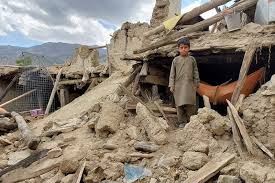Understanding the Recent Earthquake Events and Their Impacts

Introduction
Earthquakes remain one of the most devastating natural disasters, capable of causing significant loss of life, injury, and economic disruption. In recent months, several sizable earthquakes have struck continents across the globe, reminding us of the unpredictable nature of our planet. As communities struggle to recover, understanding the mechanics, impacts, and responses to these seismic events is crucial for risk management and future preparedness.
Recent Earthquake Events
In October 2023, a powerful 7.2 magnitude earthquake struck the region of Central Chile. The quake, which occurred at a depth of 40 kilometres, was felt across several cities including Santiago and Valparaíso. Initial reports indicated that over 30 individuals suffered injuries, and several buildings sustained structural damage. Emergency services quickly mobilised, conducting searches in affected areas and evacuating individuals from damaged structures.
Another significant event was recorded in Turkey, where a 6.9 magnitude quake rattled the eastern region in early November. Reports confirmed at least 20 casualties as well as dozens of injuries. The Turkish government declared a national emergency, facilitating aid provisions and deployments of medical services. In areas reminiscent of the 2020 Izmir earthquake, the resilience and preparedness plans deployed previously played a crucial role in mitigating the disaster’s impact.
Impacts and Responses
The ramifications of these earthquakes extend beyond immediate physical damage. Communities often deal with the emotional toll and psychological stress following such catastrophic events. Furthermore, economists warn about potential long-term impacts on local economies, especially in regions reliant on agriculture and tourism. Immediate financial support and infrastructure rebuilding plans are critical components of recovery strategies.
In both Chile and Turkey, local and international NGOs have begun mobilising resources to assist affected communities. Fundraising campaigns and emergency supplies are essential in providing relief, alongside long-term recovery efforts aimed at rebuilding homes and restoring livelihoods.
Conclusion
The significant earthquakes in Chile and Turkey highlight the ongoing vulnerability of diverse communities worldwide to seismic activity. These events underscore the importance of preparation and resilient infrastructure to withstand future quakes. As scientists continue to study seismic patterns, it becomes imperative for governments and communities to invest in disaster management strategies. With climate change potentially influencing geological activity, understanding the interconnectedness of our environment is vital. Moving forward, enhancing awareness and education about earthquake preparedness stands as a key factor in reducing the devastation from such natural disasters.









